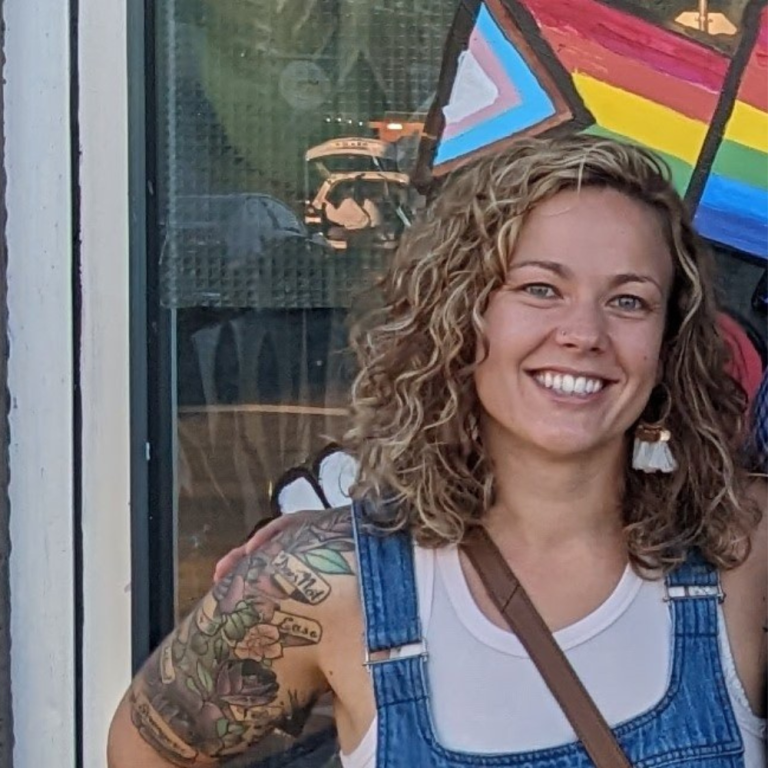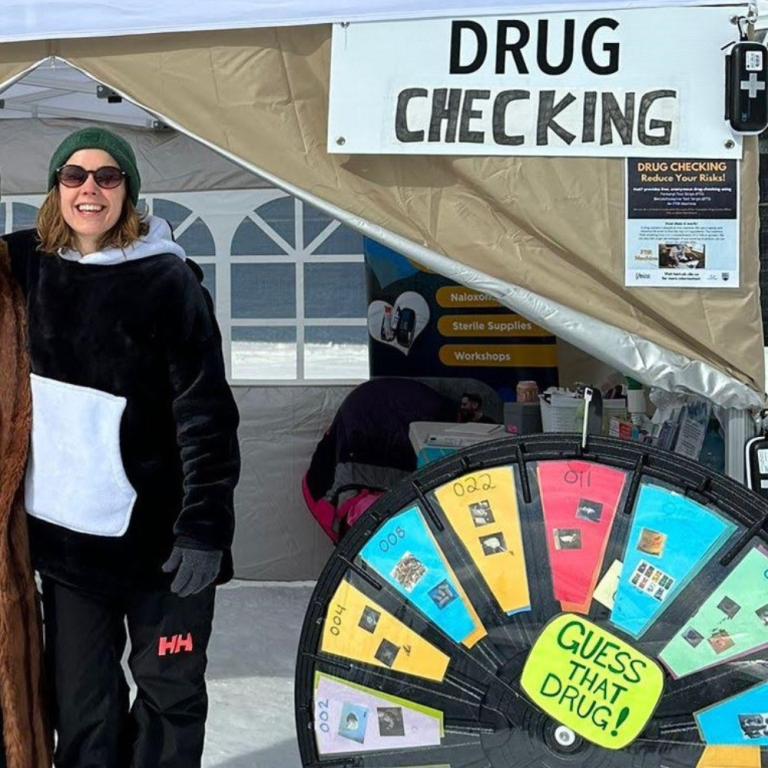 NAME:
NAME:
Lauren Airth
PROGRAM:
Doctor of Philosophy in Nursing
RESEARCH SUPERVISOR(S):
Dr. Nelly Oelke
HOMETOWN:
West Kelowna, British Columbia
AWARDS:
Graduate Research Stipend
British Columbia Graduate Scholarship
UBC Public Scholars Award
RESEARCH DESCRIPTION
My research focuses on substance use harm reduction, and how we can harness the privileges of resource-rich institutions alongside community partnerships to address the toxic drug crisis. Although the toxic illicit drug supply was declared a crisis in British Columbia in 2016, it has continued to worsen; many people die or experience other harms when they consume drugs that they do not know the contents or concentrations of. So, I am studying the impact and feasibility of the harm reduction drug-checking service provided by UBCO’s Harm Reduction Team (HaRT). HaRT provides drug-checking services on campus and in the community, at a supervised consumption site and in a non-profit harm reduction organization. Drug-checking is an evidence-based intervention; people who use drugs can bring their drugs into a service and find out the ingredients and concentrations. This information is found using a Fourier Transform Infrared Spectroscopy machine (FTIR). Interdisciplinary students and community members with a variety of lived and living experiences help to deliver HaRT’s services, which are funded in part by Interior Health. As a result, people who use drugs can make informed choices about their substance use. Just like when people consume legal drugs, like alcohol; they can see the ingredients and concentrations and know how to consume their drink in a lower-risk way. Through the Public Scholars Initiative, I will be hiring research assistants to help share the results of the drug-checking study; these activities will increase awareness of the life-saving intervention and enhance connections with community partners.
WHAT DOES BEING A PUBLIC SCHOLAR MEAN TO YOU?
Being a public scholar means conducting research that extends beyond traditional academic spaces and methods, by working collaboratively with people with lived and living experience. It is important to me to engage in creative, community-oriented ways of learning and sharing to address health-related inequities.
IN WHAT WAYS DO YOU THINK THE PHD EXPERIENCE CAN BE RE-IMAGINED WITH THE PUBLIC SCHOLARS INITIATIVE?
I think it is critical for PhD programs to make space for ways of learning, knowing, and creating that are outside of the Eurocentric norms. Through the Public Scholars Initiative, PhD students can explore creative, impactful ways of conducting research that may not always be acknowledged or funded by other awards.
HOW DO YOU ENVISION CONNECTING YOUR PHD WORK WITH BROADER CAREER POSSIBILITIES?
Since my PhD work involves partnerships with people from the university, community, and health authority, I feel there are countless opportunities to grow into a research career that is housed in pragmatic approaches. Through my PhD work, I hope to establish ongoing opportunities for collaboration between the three sectors to engage in innovative substance use harm reduction interventions. It is critical to me to build opportunities into these programs for people who have not pursued traditional academic pathways, but who hold significant expertise and wisdom through lived and living experience.
HOW DOES YOUR RESEARCH ENGAGE WITH THE LARGER COMMUNITY AND SOCIAL PARTNERS?
To conduct my research, I collaborate with an advisory committee made up of people from several areas (health authority, students who use drugs, people who use drugs and live in supportive housing, substance use researchers, non-profit harm reduction organizations). Many of these folks are the same people who help facilitate drug-checking services and related research, and several of them are also part of other historically marginalized groups. Through the research advisory committee, people from the community, including social partners, contribute ideas regarding what is most important to study and how to impactfully address inequities in a way that will benefit people who need it most.

HOW DO YOU HOPE YOUR WORK CAN MAKE A CONTRIBUTION TO THE PUBLIC GOOD?
I hope that my work will help to address the devastating impacts of the toxic drug supply. There are evidence-based solutions that we urgently need to implement. The more we understand the nuances of this crisis, the more evidence we will have to advocate for pragmatic approaches. Additionally, by sharing about my research, I hope to decrease stigma surrounding illicit substance use and to enhance understanding of why current drug policies are so harmful. Finally, I hope that through this collaborative work, we can contribute to a sense of community for people who use drugs.
WHY DID YOU DECIDE TO PURSUE A GRADUATE DEGREE?
I never imagined I would pursue graduate studies; I was the first person in my family to attend university, I failed out of my second year of my undergraduate degree, and took six years to complete my Bachelor’s (I left school for a year to work in a bar overseas). But, shortly after becoming a Registered Nurse, I had the opportunity to teach mental health clinical practice for the School of Nursing. It was through this role that my current supervisor, Dr. Nelly Oelke, told me she thought that a Master’s degree might be a good fit. Given my previous experiences, I was doubtful. However, once I got into research, I knew Dr. Oelke was right; I was honoured to connect with people who allowed me to share their stories in meaningful, change-making ways. After years of feeling discontent with my nursing practice, I realized that, for me, research could foster healing in a way that my bedside interactions could not. Ultimately, I was motivated to do my PhD so that I could facilitate research that is co-led by people with lived and living experience from historically marginalized groups; when research begins in the community, it has the most potential to strengthen and heal the community.
WHY DID YOU CHOOSE TO COME TO UBC OKANAGAN AND STUDY?
I was raised as a white settler on unceded Okanagan Syilx territory. In high school, when it came time to submit university applications, I did not have the financial means to pursue far-and-wide options. So, my high school counsellor helped me complete my one and only application to UBCO’s nursing program. I am very grateful that is where I ended up. I have learned an incredible amount about community-building and truth and reconciliation through our partnerships with local First Nations individuals. I have also continued to enjoy the beautiful Okanagan territory through skiing, swimming, climbing, hiking, and more. So, UBCO is where I have housed my academic career; I have done all three of my degrees now at this school. The small campus has helped me foster lasting, meaningful relationships with other staff, faculty, and students. It has also allowed me to push the boundaries of how health research and promotion is typically conducted; UBCO is home of the Okanagan charter, which places a high value on environments that prioritize wellbeing. Because of the university’s support, I have been able to pursue innovative work that has provided countless opportunities for many other students, staff, faculty, and community members.
Lauren Airth is a UBC Okanagan Public Scholar. Learn more about the Public Scholars Initiative (PSI).